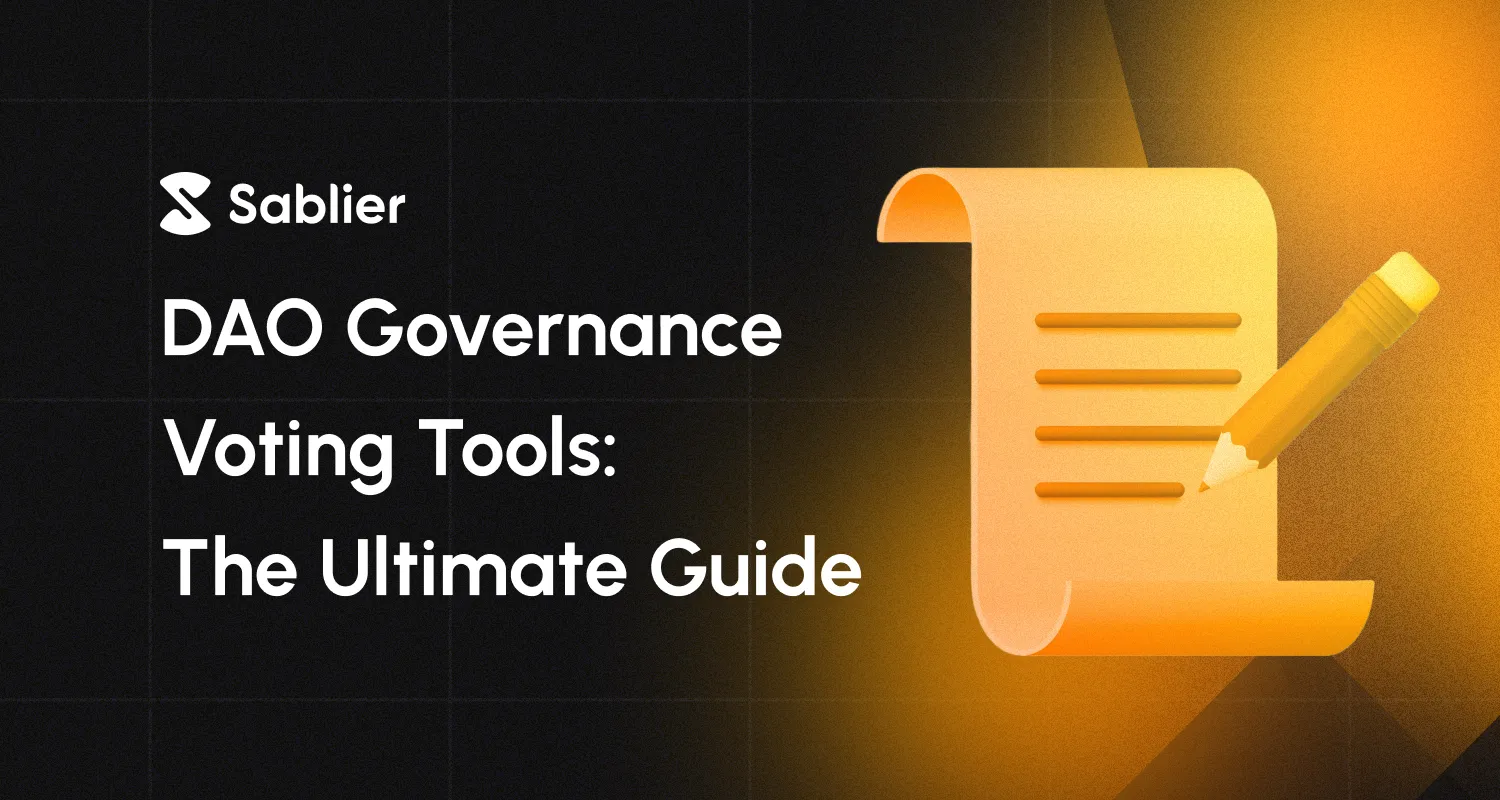DAO Governance Voting Tools: The Ultimate Guide (2024)
Streamlining decentralized decision-making: the top tools for decentralized governance.

There will be more decentralized organizations in the future. Whether that’s under the form of DAOs specifically, or under the form of new entities that will be invented in the future, we don’t know yet. Though it’s pretty clear that there will be thousands, millions even, of these organizations powered by crypto tech.
The question is how to best organize governance processes in these organizations. There is a fine line between optimizing for user experience (so more people vote), and decentralization.
An offchain solution with social login support (where you can login with your Google account, for example), is probably the most ideal solution in terms of user experience, and will probably get the highest rate of participation. But it’s also the most centralized solution.
A fully onchain governance protocol could guarantee full decentralization, transparency and sybil-resistance, but at the cost of a great user experience, which would probably result in a lower participation rate.
Finding that balance is key. In this blog post we will go over the various governance solutions available in the crypto ecosystem at the moment, that organizations can rely on to grow and prosper in a decentralized manner.
Aragon
Started back in 2017, the Aragon project pioneered on-chain governance, all while building the tools and the foundation for a world where DAOs become the norm.
But Aragon isn’t just a voting platform, it’s an all-in-one solution for DAOs. In the Aragon App, you can create a DAO in a few clicks, members can vote on proposals, manage finances, etc. and the whole Aragon stack is, of course, fully open-source.
With Aragon OSx, an advanced modular DAO framework, projects can customize their governance safely and easily. Governance logic is programmed into plugins, which DAOs can then install, upgrade, or uninstall. This allows governance to evolve over time, and also allows everyone to benefit from innovations in governance, as the plugins are open-source, easy to install, and compatible with any Aragon DAO.
Aragon is fully onchain, though they have made the user experience as seamless as possible, allowing you to deploy a DAO without any code in a matter of minutes. It follows that the voting process is also fully onchain, and requires voters to sign a transaction when voting.
Lido, API3, Decentraland and many others use Aragon to power their organization.
Tally
Tally is an all-in-one DAO governance platform as well that offers DAO contributors the ability to vote, create proposals, and delegate. Tally powers more than 10x onchain DAOs than any of the other DAO governance platforms, secures over $30b, has supported the transfer via onchain proposal of nearly $700m in value. It’s been in operation since 2020.Because all voting happens onchain so that votes can be executed permissionlessly, voters pay gas fees—usually just cents on L2s. Onchain voting has the advantage of increased censorship resistance and transparency—more on that here.
“Tally is shaping the future of credibly neutral protocols through onchain governance. We partner with protocols to launch their governance so they are set up for truly decentralized, sustainable, and effective decision-making. Protocols that use Tally thrive in the long- and short-term.” – Dennison Bertram, Co-founder and CEO, Tally
Tally acts as a frontend for Compound's Governor contracts (now considered deprecated) and OpenZeppelin's Governor contracts, the gold standard of onchain voting. Tally offers a simple but very effective approach to DAO governance, the setup is quick, and it can also be used as an interface to interact with DAOs that have a voting system based on Compound Governor or OpenZeppelin Governor. They support over 500 DAOs on over 60 chains: Arbitrum, zkSync, Wormhole, Uniswap, Gitcoin, ENS, etc. are all supported.
Tally also offers other features, like the ability to manage DAO finances by including a no-code token swap transaction in a proposal, staking via the Tally Protocol, and multichain governance.
Snapshot
Initially exclusively an off-chain voting solution, Snapshot recently launched Snapshot X, an onchain voting protocol to compete with the likes of Tally, Aragon, DAOHaus and others which are fully onchain.
Offchain voting is less decentralized, but offers greater flexibility and has the advantage that voters do not have to pay transaction fees when voting: all they have to do is to sign a message using their wallet.
“Snapshot is built for the fluid and rapidly evolving landscape of Web3 governance, providing DAOs with the most modular on-chain governance protocol and the flexibility to implement structures based on their unique vision.” – Jeremy Musighi, COO, Snapshot Labs
An interesting setup is to use Snapshot’s offchain voting system as a signaling mechanism, to check if the community would be open to a certain proposal, and then use Snapshot X, or an onchain competitor for the actual voting process.
Speaking of Snapshot X, it differentiates itself from competitors by focusing on both flexibility and modularity. Users can customize voting strategies, proposal validation strategies, execution strategies, etc.
Snapshot can be set up in a matter of seconds, and allows many different types of voting, such as quadratic voting, weighted voting and of course basic voting.
Arbitrum, Aave, Uniswap and many other leading platforms in the crypto space leverage Snapshot for signaling/voting purposes.
DAOHaus
A lesser known but equally interesting option is DAOHaus.
Based on MolochDAO, a pioneering decentralized organization focused on allocating capital towards Ethereum infrastructure, DAOHaus allows organizations to set up a DAO that includes a voting platform, a Safe multisig wallet, with the ability to execute chains on EVM chains like Ethereum, Gnosis, Optimism, Arbitrum, Polygon and Celo, including in a cross-chain manner.
“DAOHaus is built on the belief that ‘If you want to go fast, go alone. If you want to go far, go together.’ This ethos drives its community-centered approach. DAOHaus supports those willing to experiment and iterate, fostering open collaboration to discover new solutions in the vast and evolving DAO design space. We have only just scratched the surface of the possibilities.” – Dekan from DAOHaus
DAOHaus is a particularly attractive offering for those looking to build custom tooling around it, as it’s entirely free, open-source and forkable solution, with the added benefit of a fully featured SDK.
DAOHaus has been used by the likes of Protocol Guild, Gitcoin, MetaCartel, RaidGuild, Hats and others.
Conclusion
There are many options available, the key is to find the suitable balance between security, decentralization and censorship-resistance, and a great user experience that makes it incredibly easy to participate in governance proposals and keeps DAO members engaged and involved within the community.
Each platform has its upsides and downsides, and some may be a better fit for specific use cases, an example being Snapshot’s offchain solution that is used by several DAOs for signaling, before the actual onchain voting takes place.
- Want to get started with Sablier? Check out the user interface here.
- Want a demo? Fill out this form, and we will reach out to you.


